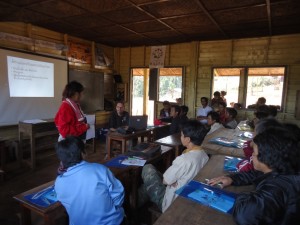Sekong : Tuberculosis Project
SFE tuberculosis project is part of the Lao country wide fight against TB, applying the DOTS strategy developed by WHO to reduce morbidity and mortality due to the disease by giving equitable access to high quality diagnosis and treatment. SFE is present in Sekong province since 2009 to provide medical support to provincial and district hospitals and to implement and optimize the quality of DOTS strategy at all levels (provincial and district hospitals, health centers and villages). SFE emphasize his action on the training of village health volunteers and medical staff to improve TB detection, on the training of laboratory staff to increase diagnosis effectiveness and on the improvement of laboratory activities related to TB diagnosis.
The project
Tuberculosis remains a major public health concern in Laos. Poverty, poor housing, lack of basic sanitation, malnutrition, lack of education and limited access to functional health services are factors that have an important impact on the development of the disease. The population, leaving in remote area far from the health services, is less susceptible to be detected and treated. To address this issue, the national tuberculosis program has been established to implement the DOTS strategy developed by WHO to reduce the tuberculosis burden.
Objectives
SFE supports the implementation of the national fight against tuberculosis in Sekong province, one of the poorest of the country, through a project aiming to:
- Improve the detection of tuberculosis
- Improve the monitoring of the patients
- Improve the quality of the diagnosis
Activities
To meet the objectives, activities have been developed and adapted to the local issues: road accessibility, ethnic language, beliefs, educational level. In Sekong province, access from the remote villages to district hospital or health centers is very poor and requires, in some cases, several walking days. Consequently, only a few people go to the dispensaries to be detected. Improvement of TB detection implies to work at village level with the health volunteers and to sensitize the population regarding the disease.
SFE has developed training sessions for village health volunteers and village authorities (village chief, woman union representative etc). They learn how to recognize the symptoms of the disease, how to do prevention, how to refer any suspect to the health centers for diagnosis, and how to control the patient daily treatment uptake. The SFE mobile team covers every zones of the province with the objective to train all the health volunteers. SFE mobile team also organizes community awareness in the villages to inform the population about the disease, its curability, the prevention and treatment. In addition, SFE mobile team monitors the TB patients in the village, specially the treatment uptake, and controls the family, with a specific attention to the children for any signs of the disease.
Good quality of diagnosis implies high qualified medical staff and good sample collection. The SFE organized specific training for the laboratory technicians, once a year, to review the microscopy technique used for TB diagnosis, to increase technical skills and address technical issues when necessary. The quality of the diagnosis relies not only on a good practical technique but also on the quality of the specimen. Indeed, several factors can alter the sputum sample (e.g. long exposure to heat during the time for sputum delivery to the district hospital) and impair the diagnosis. To face this issue, a pilot study was set to test the feasibility of making sputum smear slide at health center level (which is nearest to the village than the district hospital). This should increase the quality of the diagnosis and the number of cases detected from remote area. Specific training for dispensary staff on the sputum smear slide technique was performed and the quality of the slide made at dispensary level is regularly monitored. A global evaluation of the study will indicate if this strategy reaches its goal.
Indicators
- The training of the village health volunteers should result in an increase of case detection in remote area.
- The pilot study aiming to have the diagnostic slides made by health center staff should reveal whether this approach provide better slide quality and improve case detection from remote area.
- Training of the laboratory technicians on a regular base is expected to improve the quality of the diagnosis. This improvement will be assessed by the internal quality control performed by the national tuberculosis center.


